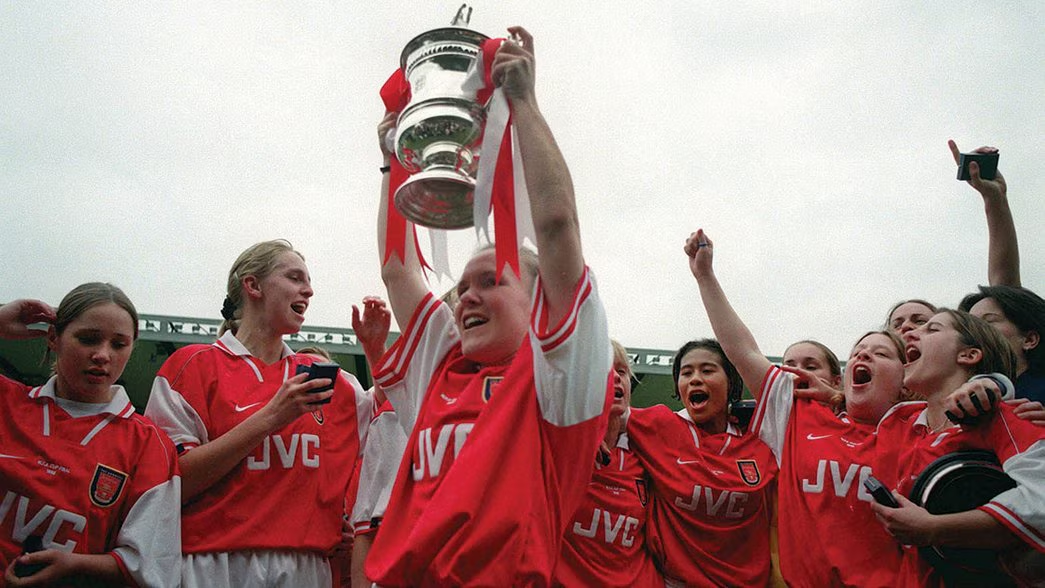Arsenal in the Community has given life to hundreds of programmes and initiatives all aimed at helping local people, regardless of how they feel about football. But there’s something else.
Arsenal in the Community has also given life to a football club, one that has claimed 50 major honours in 35 years, set records that may never be broken and continues to be a leading force in the game. That club is Arsenal Women.
It all starts with Vic Akers. In 1985 the recently retired footballer, who had played for Cambridge United and Watford in the Football League as well as a host of non-league teams in his career as a left back, returned to his native Islington after leaving his final club, Carshalton Athletic. It wasn’t long before he was helping to set up and run fledgling initiatives at the recently established Arsenal in the Community department, and Akers’ hands-on nature and commitment to the club would have a far-reaching impact on an entire sport.
Small beginnings
One of Arsenal’s female employees played for Aylesbury, a connection that had already led to staff helping out with the club’s operations as part of their community outreach work. Women’s football generated little interest in England at the time, but Akers sensed not just an opportunity but almost an obligation to help girls and young women discover and fall in love with the game. In 1987 Arsenal assumed control of Aylesbury and Arsenal Ladies, as the club was originally known, was born, with Akers taking on the role of coaching and managing the squad – this alongside his leading role at Arsenal in the Community and his responsibilities as both Arsenal youth coach and kit man for the first-team squad. He recalled years later that people were shocked that he was devoting himself to women’s football, let alone doing it on top of all his other commitments.
Success was far from immediate and such was the scarcity of both funding and interest that Arsenal Ladies restricted themselves to cup competitions for the first four years. Akers was far more than just a coach and manager, though – he became a mentor to his players and he devoted himself to them.
As Arsenal Ladies legend Alex Scott reflected, “He was always on his phone, 24/7. I often couldn’t get through to him until nine or ten at night, but he always answered. He never switched off. He was so well respected in women’s football that people would tip him off. So it was rarely a coincidence for him to uncover a young player.”
That commitment demanded loyalty and, in an era when women’s football was completely amateur, Vic did two other things that helped his players commit themselves to both the game and the team: firstly, he helped them find jobs wherever he could around the club, whether that was in marketing, accounts, the box office or the laundry; secondly, he made them feel like professionals on the pitch.
“Vic was that second father figure to me,” said Scott. “He fought for and drove women’s football in this country at a time when not many people did. He pushed me and motivated me to want to be the best every single day. I wouldn’t be the player and person I am without Vic.”
Akers’ fierce determination to turn Arsenal Ladies into a force began to pay off in the early 1990s, with the club lifting their first silverware, the Premier League Cup, in 1992 and the Premier League and FA Cup double the following season. By the turn of the century the Gunners had won 13 major honours, but that was merely the foundation for a decade of domination that reached its zenith in 2006/07 when Arsenal Ladies won an unprecedented quadruple – Women’s Champions League, Premier League, FA Cup, Premier League Cup – without losing a single game in any competition. This was the ultimate reward for Aker’s professionalism and determination.
Thinking big
It may seem hard to believe now but the Gunners hadn’t turned semi-professional until 2002, despite support from manager Arsène Wenger and then vice-chairman David Dein. Clare Wheatley, the former left back who is now Arsenal Women’s head of football, recalled entering the Arsenal boardroom to pitch the suggestion that she and her team-mates should be paid – not a salary, but a win bonus of £100 per victory.
“David Dein listened and he was forward-thinking, and he always had a rationale as to why the women’s club should exist. It wasn’t about money because, financially, there was nothing in return. It was about giving opportunities to female players of a certain level to be able to live their dreams,” said Wheatley.
“Of course it has shifted slightly down the years. Back then there weren’t the eyes on the game to justify spending money. There wasn’t the broadcasting revenue. So Arsenal did it because it was the right thing to do, and they firmly believed in their hearts it was the right thing to do for the women’s game.”
And that still comes back to the passion and dedication of the man who founded the club from his desk at Arsenal in the Community.
In 2018 Arsène Wenger said of Vic Akers, “It is absolutely unbelievable what he did. Unfortunately, he did it at a time where women’s football was not popular or rated so much. I am convinced he is a real football connoisseur, who has the instinct of managing, and I think with time he will get the recognition he deserves. The women’s game would be nowhere near where it is today if it was not for him.”
And it all started right here.
Copyright 2024 The Arsenal Football Club Limited. Permission to use quotations from this article is granted subject to appropriate credit being given to www.arsenal.com as the source.










